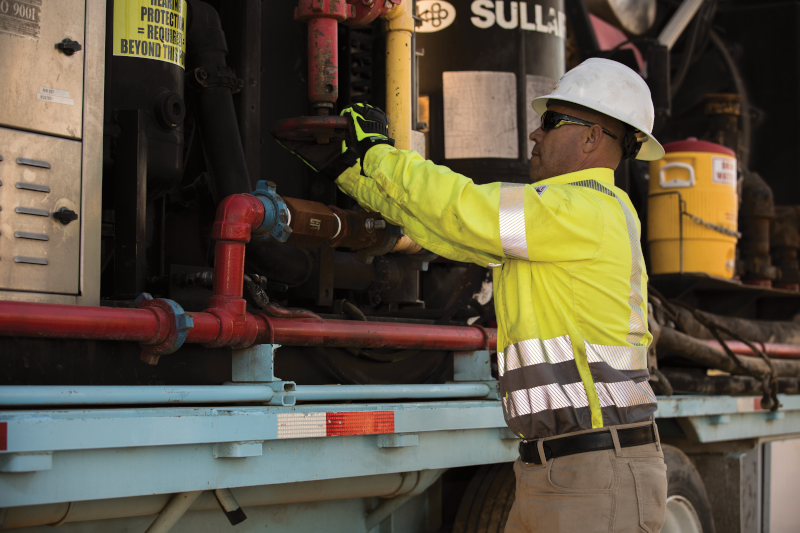
Employee safety should always be a primary concern for employers when considering employee work uniforms. If an employee is exposed to fire through the equipment they use, or even if they are exposed to sparks or very hot tools that can cause a fire when in close proximity to fabric for any length of time, it is crucial to provide them with a uniform that protects them.
Alsco Uniforms can help employers design and produce a uniform program for their employees that is appropriate to the task at hand and protects them from injury on the job. This may include the use of flame-resistant or flame-retardant clothing.
What Does “Flame-Resistant” Mean?
Flame-resistant is a characteristic of a fabric or clothing to resist ignition and to self-extinguish if ignited. Generally, such clothes are made from cloth woven from fibers that are inherently resistant to fire.
What Does “Flame-Retardant” Mean?
Flame retardants are chemical substances used to impart flame resistance to clothing. Some flame-resistant clothes are made from fabrics that have been treated with chemicals that enable them to extinguish flames or sparks when exposed to them. Over time, these chemicals will be washed out of the clothing rendering them ineffective in providing protection without reapplication of chemicals.
What Is the Difference Between Flame-Resistant and Flame-Retardant Clothing?
The first difference between flame-resistant and flame-retardant clothing lies in the items’ production. Flame-resistant fabrics are made of fibers that naturally resist burning when exposed to flames, whereas flame-retardant fabrics are treated with chemicals to make them resistant to fire, essentially extinguishing any flame that strikes them.
Another difference between clothing in these two categories is cost. Typically, flame-resistant clothes are slightly more expensive than flame-retardant clothes, but they may require less frequent replacement.
How Long Do Flame-Retardant & Flame-Resistant Clothing Protect Against Fire?
How long the clothing protects the wearer from continual exposure to fire depends on the level of protection provided. You must consider the circumstances your employees typically work in.
The National Fire Protection Association (NFPA) offers a guide to understanding the differences between differently classified flame-resistant and flame-retardant clothing to assist employers in protecting industrial personnel from short-term exposure to fire. These hazard risk categories are ranked from Category 1 to Category 4. The higher the category, the more protection is offered for a longer period of time. In most cases, low-hazard tasks require only a Category 1- or Category 2-level of protection.
Are All Uniforms Available in Flame-Resistant or Flame-Retardant Fabrics?
In most cases, uniforms can be made to the specifications of the business. Flame-resistant thread can be used for details like embroidered logos and name tags. This means that even these small sections of the uniform are resistant to fire.
If there is a concern that parts of the body need more protection than others or that fire protection is required only for specific tasks, it is possible to choose PPE that addresses just these issues. For example, shoulder-length gloves can be used for fire protection for certain tasks, and aprons add an extra layer of protection to the lower half of the body.
In many cases, when a work task exposes some employees but not all to open flames or very hot equipment, all employees wear flame-resistant or flame-retardant uniforms. Employees who deal directly with the open flames or hot items wear higher classes of flame-resistant PPE for further protection. This ensures that everyone has at least some degree of protection, and the safety and protection level is scaled to more specific tasks.
Are Flame-Retardant or Flame-Resistant Uniforms a Better Choice?
Because flame-resistant uniforms last a bit longer than flame-retardant uniforms, they are more expensive. But that doesn’t always mean they are the better choice overall.
At Alsco Uniforms, we believe that flame-resistant uniforms are the better choice, even though they cost slightly more. They are more durable, more effective at resisting flames and sparks and last longer.
No matter how often they are laundered, fr uniforms will continue to resist fire. However, with flame-retardant clothing, the fabric is treated with chemicals that wear off over time.
Alsco Uniforms offers flame-resistant uniforms as a part of our uniform rental offering. We customize the uniforms to your specific needs, ensuring your employees look professional, feel comfortable and stay safe. We offer flame-resistant coveralls, work and uniform shirts, pants, bibs, jackets and coats.
When you task us with taking care of your uniforms, we repair and replace them as needed and maintain them exactly as the manufacturer recommends. You won’t have to worry about the condition of your uniforms. They will always be fresh and free of stains and tears.
Are Flame-Resistant Uniforms the Right Choice for Your Business?
If you would like to discuss options for employee uniforms, we are here for you. We specialize in providing the uniform care and maintenance necessary to keep your employees protected at all times while also making sure they are a good representation of your company’s values.
Contact Alsco Unfiforms now to learn more about how we can streamline the management tasks in your industry with our uniform cleaning service. We can take a lot of the headache out of choosing uniforms for your business, ensuring your employees look good and stay safe.
References
Standard on Flame-Resistant Clothing for Protection of Industrial Personnel Against Short-Duration Thermal Exposures from Fire. (2023 Edition). National Fire Protection Association.
When Safety and Comfort Count. (May 2009). The New York Times.
